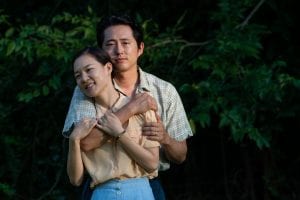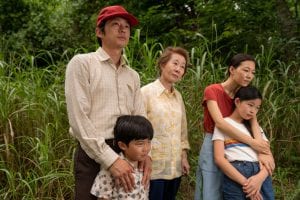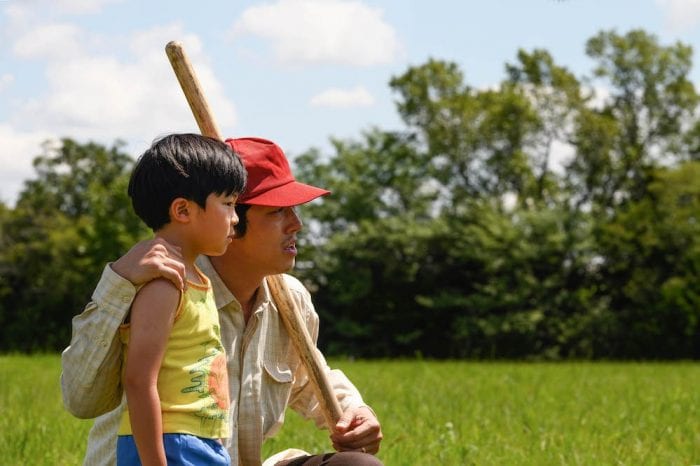Movie Review: ‘Minari’ – a beautiful film about the American dream
Reviewed by Jeffrey Sanzel
In the opening shot of director-writer Lee Isaac Chung’s engrossing Minari, the Yi family arrives at the Arkansas land that the father Jacob (an extraordinary Steven Yeun) purchased. Jacob drives the truck with the family’s possessions. His wife, Monica (Han Ye-ri, simultaneously heartbreaking and a pillar of strength), follows in their car. A small crack in the windshield is almost indiscernible. But this fissure reflects the slow fracturing of the couple’s relationship.
Minari is a thoughtful film, both delicate and tense. And while the story is intimate, it is not small. It deals with the clash of family responsibility and the desire to follow a dream.

Initially, Chung wanted to adapt Willa Cather’s My Antonia, but he discovered the late author’s wishes blocked any screen adaptations. Still wanting to create a tale of rural life, he turned inwards and created a semi-autobiographical work inspired by his upbringing. He begins with a list of eighty childhood memories and guidance from Cather’s words: “Life began for me, when I ceased to admire and began to remember.” From this unusual start, Chung fashioned the wholly personal screenplay for Minari.
Jacob Yi has brought his family from California to Arkansas to start a farm — his own “Garden of Eden.” It is 1983, and 30,000 Korean immigrants were entering the United States annually. Jacob plans to grow Korean produce for sale to stores in Dallas. The Yis take-up residence in a single-wide, fourteen-foot trailer on the plot, and Jacob begins to farm. Monica’s stoicism cracks with their change in life: “It just gets worse and worse.”
In the meantime, Jacob and Monica continue the work they had done in California, sexing chickens in a hatchery. To watch their two children, they bring Monica’s mother, Soon-ja (Youn Yuh-jung, brilliantly eschewing any caricature of a grandmother), over from Korea.
 While the family has come for a new start, the marriage shows signs of deep trouble. There are disagreements about where to live and how to spend their money; they don’t fully agree on dealing with their son’s heart murmur. They live in a cold distance, with anger always brewing under the brittle surface. Moments of affection are severed by the movement of a hand, the turning of a head, or the shrugging of a shoulder. The children’s stress reflects their parents’ inability to communicate. Soon-ja observes, “You two will fight over anything.” The daughter, Anne (Noel Kate Cho, mature beyond her years), is more parent than child, running interference and caring for her younger brother, David (Alan Kim, real, honest, and very funny).
While the family has come for a new start, the marriage shows signs of deep trouble. There are disagreements about where to live and how to spend their money; they don’t fully agree on dealing with their son’s heart murmur. They live in a cold distance, with anger always brewing under the brittle surface. Moments of affection are severed by the movement of a hand, the turning of a head, or the shrugging of a shoulder. The children’s stress reflects their parents’ inability to communicate. Soon-ja observes, “You two will fight over anything.” The daughter, Anne (Noel Kate Cho, mature beyond her years), is more parent than child, running interference and caring for her younger brother, David (Alan Kim, real, honest, and very funny).
Two pieces become central to the story. The first is water, the essential element of farming. Its importance in its presence and absence threads through the entire film. The need for water comes full circle, almost as a washing away of mistakes that have come before. The water allows for a fresh beginning.
The second is the connection between David and his grandmother. Forced to share a room, he dislikes her for not being what his idea of a grandparent should be. His concept is the cookie-baking, non-swearing elder of American media. But from her, he draws strength and begins to leave the fear of illness behind. The bond is a real one; there is nothing precious or sentimental. The grandmother takes him to plant the titular minari (a sort of wild celery). For her, minari represents all that is wonderful: it protects and heals; it grows wild and yet nurtures. It is perhaps not the subtlest part of the film, but it perfectly defines the grandmother-grandson link.
Elements of Korean culture — in food, discipline, and family — are carefully woven into the film, present without being “presented.” There is a yearning for their homeland but also the shadow of the Korean War. The parents predominantly speak Korean to each other and the children. The children respond in kind. However, between them, Anne and David speak English. Language is both communication and barrier, constantly floating and shifting. American culture appears in some of the most unlikely places. The obsession with Mountain Dew is both amusing and telling.

The film lives in the beats and the silences. Whether it is a shot of the idyllic verdant landscape or the dark, cramped trailer, life unfolds. While beautifully cinematic, there is no artifice. In an unusual and exquisite performance, Will Patton plays Paul, a Korean War veteran who works side-by-side with Jacob. Paul, who is a bit of a religious fanatic, chatters and blesses. But he is kind, and, even in his eccentricity, Paul is grounded in the established world.
When the family attends church, the citizens of the nearby town welcome them. They are not a hillbilly send-up, with a reception that is kind if a bit awkward. While Monica was the motivating force to attend, she decides not to return but sends the children each week. The Yis face curiosity, subjected to the occasional peculiar question or comment. But they are not ostracized or mistreated. Chung offers human beings and not archetypes.
Discussions about religion and heaven, many of them directed towards David, swirl about the characters. But in the end, Minari is about a different kind of belief. With its flawless cast and sensitive writing and direction, the film illustrates the ability to overcoming obstacles. It shows faith in self, growth, and the love of family. In short, Minari is about life.
Rated PG-13, Minari is now streaming on Amazon Video
Photos courtesy of A24







